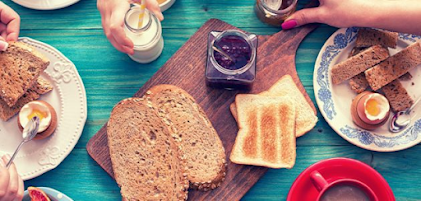The foods you choose for breakfast will be important to keep you energized for the rest of the day. Are you choosing well?
It's the most important meal
Every meal we make matters, it's true. But, as the name implies, breakfast is the first meal the body receives after a prolonged overnight fast.
What your body ingests at that moment is processed in a particular way: what we eat predisposes our body and, to a large extent, our mood, the processing we make of sugar and the work of our glands. This makes it the most important meal of the day.
1. Packed cereals
They are practical, they seem to have vitamins and minerals, but be careful! They have excessive amounts of sugar, even more than crackers or soda. Let's read the boxes and compare the numbers, especially if we give them to our children.
The suggestion of nutritionists and specialists is to avoid their consumption altogether, especially not to give them to our children.
2. Bread or cake with butter and sugar
There are few pieces of bread on the market that include fibre. Processed flour does not conserve its nutrients and provides us with empty calories that, instead of nourishing us, inflame and make us sick.
Cakes, baguette bread, box cookies and crackers or doughs include refined flour. Its consumption generates spikes in blood glucose. This causes little satiety, with the urgent need, in the short term, to re-feed.
Even worse than giving your body that sugar bomb is adding unhealthy fats to it. Sometimes we eat bread and butter, a bad choice!
3. Fruit juices
These tempting products, presented as 100% fruit, or authentic, do not adequately inform us. If you stop to read the labels, you will see that they are high in sugar. Especially the industrialized ones.
They contain little fruit, and in addition to the natural sugars of the same, they are sweetened with cane sugar or high fructose corn syrup, which generates obesity and greatly affects our body. At the very least, clogging the arteries.
In addition, they contain additives, dyes and chemical compounds that do not nourish and harm.
If, faced with this panorama, you feel like another natural orange juice, calm down! Nor is it recommended to ingest natural ones. It is better to replace them with whole fruit consumption, as juices provide only excess sugar and no fibre.
For example, buying yoghurt with industrialized fruit can attract us, which, because it is dairy, would contribute protein, we think, but we should not be too confident either.
These processed foods are also deceiving. For example, 0% fat Greek yoghurt supplements this tempting offer by increasing the sugar level of the products. The elimination of fat in dairy products and the increase in sugar makes the effect of satiety less and our choice does not nourish us.
These dairy products, when they promise to include fruit, also mix it, on many occasions, with the terrible corn syrup, including dyes and industrialized fruit pulp.
How about a glass of milk?
Experts explain to us that it is not a good option either, as lactose is also processed quickly, like sugar. In addition, almost all commercial milk are industrialized. Do you also add cookies? They are ultra-processed foods, full of sugars, hydrogenated fats, ultra-processed flours.
Based on this, we can conclude that the famous milk drinks prepared are not suitable for our little ones either.
Oatmeal, honey, nuts in a wrapped bar seems like a possible nutritious option, right? But by reading the labels we will get out of doubt.
These packaged products are also a poor choice, as the bars also contain sugar and corn syrup, which raise blood sugar, raise glucose levels and generate inflammation.
They are also low in fibre and low in protein and make us hungry shortly after eating them.
6. Sausages
Sausages are widely consumed in many families due to their practicality: portions are easily measured, are kept for a long time and are always available. Plus, they're an economical way to include meat in almost any meal. But do you know what they're made of?
Most of them include a variety of meat that the producing companies have discarded from other sales: chops, carcasses and almost always pork. The labels indicate the highest percentage of protein they contain, but almost always, they are also accompanied by soy, fat and other meats.
7. Prepared coffees
When you're in a hurry, it's delicious to stop by your favourite coffee shop for a cappuccino, or a white mocha. You drink it from a cardboard cup while you solve some pending issue, and you think about what you'll have for breakfast later. Lots of calories!
If we like coffee, experts recommend drinking it black or with milk. We have no idea how many calories we drink. In addition, we accompany them with cakes, cookies, bread, saturating our body with harmful, ultra-processed, little or no nutritious calories.

Comments :
Post a Comment